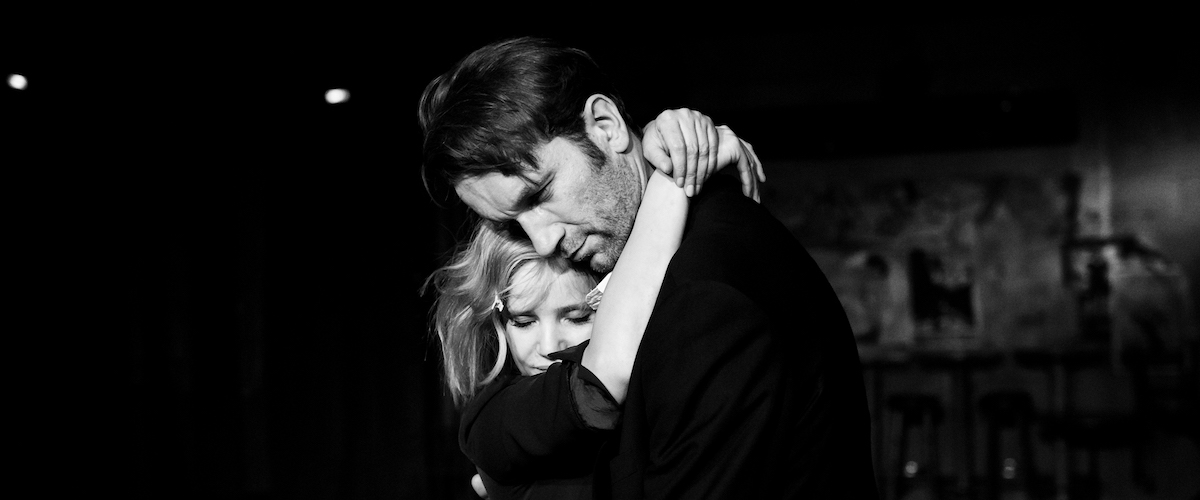By Chlotrudis Independent Film Society
Rating: 4.5 cats
Director: Pawel Pawilkowski
Starring: Adam Woronowicz | Agata Kulesza | Borys Szyc | Cédric Kahn | Jeanne Balibar | JoannaKulig | Tomasz Kot

Original language title: Zimna Wojna
Country: france, poland, united_kingdom
Year: 2018
Running time: 85
IMDB: https://www.imdb.com/title/tt6543652/reference
Chris says: “Pawel Pawlikowski’s follow-up to IDA is cut from the same fine-polished glass: set in post-war Poland and shot in 1:33 black-and-white by cinematographer Łukasz Żal, it spans a fifteen-year period (leading up to roughly the time of the previous film) over which jazz musician Wiktor (Tomasz Kot) and younger singer Zula (Joanna Kulig) have an on-again, off-again love affair. They first meet in a sanctioned troupe meant to spotlight traditional Polish song and dance. Wiktor, disillusioned as the Communist government transforms it into a propaganda vehicle, finds himself wanting to defect from his homeland, while the strong-willed, gregarious Zula has other designs.
“Using his own parents as inspiration for the leads, Pawlikowski recreates a culture in the throes of a severe political takeover, drawing implications from the minute to fully societal as he limns his focus onto two very different people who nonetheless are drawn to each other. Each frame is a lovingly crafted tableau, strikingly rendered in high-contrast black-and-white and deep focus photography. The mostly diegetic soundtrack, ranging from hard bop jazz to hymn-like folk songs is a character in itself. I’m not sure if this is ultimately as deep or clever as IDA was, but in the end, it resonated with me a little more. 4.5 cats”
“(Screened at the 2018 IFFBoston Fall Focus.)”
Thom says: “This hugely-lauded film deserves any accolades it’s received and I fell for it as well in a big, purple way. It won the Chlotrudis Best Cinematography award & the gorgeous young Kulig was nominated for Best Actress for playing the enigmatic Zula. A grand friend in the UK had also been pestering me to see it for a few months & I’m sorry it took me so long to get to it. The black & white cinematography is truly top-of-the-line, with great shading, a stunning success. Yet another element that I found unforgettable was the economy of the film, every scene eliciting crucial information in subtle ways that makes the audience stand-up-&-take-notice. It’s true that occasionally the scene-shift can be from minute-to-minute but it’s more likely to be hour-to-hour, day-to-day, month-to-month, or even year-to-year.
“A Polish music director (Wiktor) is putting together a young chorus of promising singers and decides to take-on a girl (Zula) who reportedly had killed her step-father over unwanted sexual advances earlier in her teens. There’s a bit of a Svengali approach as he wants to turn her into a star but they fall deeply in love, irretrievably so, with almost every scene presaging a disturbing ending. After long, hard work the group emerges as an-European-tour-ready singing group with catchy folk-dancing & facial gestures to boot. Wiktor plans to defect when the act arrives in Paris and he apparently persuades Zula to come with him. But, at the last minute she decides to hold back and remain with her troupe. He joins a jazz ensemble and pines for Zula. They have a brief meeting some years later when she returns on tour but she’s now married to an Italian Count. Their dense love story goes through Berlin, Yugoslavia, back to Paris, and finally in an act of desperation back to Poland. I truly was hooked from beginning to end but I do have some reservations. While Kulig shines with talent both within herself and as the character she portrays. Zula, however, is alarmingly puzzling, for, on one hand she seems indifferent to his planning a life for them, then goes through insufferable lengths to save him after they’ve both gone back to Poland. A very gloomy film, but rewarding as well.”
